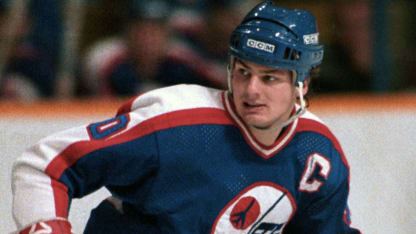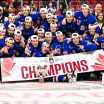NHL.com's Q&A feature called "Five Questions With …" runs each Tuesday throughout the 2017-18 regular season. We talk to key figures in the game and ask them questions to gain insight into their lives, careers and the most recent news.
The latest edition features Hockey Hall of Fame center Dale Hawerchuk, who was inducted into the Winnipeg Jets Hall of Fame on Nov. 14.
Five Questions with Dale Hawerchuk
Hockey Hall of Fame center on special connection to Winnipeg, life as OHL coach

© Graig Abel/Getty Images
By
Tim Campbell
NHL.com Staff Writer
WINNIPEG -- Dale Hawerchuk remains strongly connected to hockey and to his first NHL team, the Winnipeg Jets, more than 20 years after he played his last game in the League.
Selected by Winnipeg with the No. 1 pick of the 1981 NHL Draft, Hawerchuk had 1,409 points (518 goals, 891 assists) in 1,188 games over 16 seasons with the Jets, Buffalo Sabres, St. Louis Blues and Philadelphia Flyers. The center is 19th on the NHL all-time points list and was inducted into the Hockey Hall of Fame in 2001.
With the Jets, Hawerchuk had 929 points (379 goals, 550 assists) in 713 games over nine seasons and won the Calder Trophy as the top rookie in the League in 1981-82 after he had 103 points (45 goals, 58 assists) in 80 games. He was their captain from 1984-90.
This season is Hawerchuk's eighth as coach of Barrie of the Ontario Hockey League, but the 54-year-old has had plenty of opportunities to reminisce about his days in Winnipeg over the past 13-plus months.
Hawerchuk was Jets captain at the 2016 Tim Hortons Heritage Classic alumni game in Winnipeg, and he was inducted into the Jets Hall of Fame on Nov. 14, even though he played for the first iteration of the team (1979-96).
"My playing days will always be special to me," said Hawerchuk, who had 100 or more points six of his first seven NHL seasons, finished second to Wayne Gretzky of the Edmonton Oilers in voting for the Hart Trophy as League MVP in 1984-85, and won Canada Cup titles with Canada in 1987 and 1991. "I've always had the passion for the game. I think that drove me through the longs parts of winter and the season, the ups and downs. It's the one thing I always look for in hockey players when they come up: When the moon and stars are out, it's great, but are you still passionate in the storm, when things aren't going great?"
Hawerchuk said it was too difficult to single out one thing when asked to pick a favorite memory from his career.
"Every day being in the NHL," he said. "I was the only guy on my street that made it. We all wanted to make it, and I happened to be the guy that made it. To be able to come here and play and practice, it was so special. How does life get any better? A lot of good memories here -- your first game, your first goal, winning a playoff round, the whiteout. Scoring the 50th (goal) here. A lot of great moments."
Here are Five Questions with … Dale Hawerchuk:
Your personal hockey evolution has taken you to coaching. What's that journey been like?
"It's just like when you played, you never stop learning. If you think you know it all, you're going to dead-end yourself. I learned right from my first game to my last game. And I love listening to different concepts now. Sometimes I'll go find stuff on YouTube, different things that coaches are talking about. I've never stopped learning. Sometimes it's just little things that click and you just add that to your arsenal, the same as a player. I'm always watching other teams and players, talking to ex-players or scouts. I was a sponge that way and I'm still that way. There are many ways to do it, but the more information you get, the better you can be."
You have always maintained connections to Winnipeg. How do you feel about your on-ice connections in today's NHL, having coached Mark Scheifele for three seasons and Jets forward prospect Brendan Lemieux for three-plus seasons in Barrie?
"Every player is different and their path will be different. It's always intriguing to me how to channel a player's abilities, things you see in them, both good and bad. Everybody's got warts, weak points that go with the strong points. There's a balance required. You have to develop your strong points to another level and strengthen your weak points so that you're able to be successful. Some grasp it quicker, some later, and some never grasp it. That's the challenge as a coach, to always keep pushing so that you feel like they'll grasp it at some point. The one thing Mark and Brendan have is a passion for the game. They've both had different routes. But it's the one thing I've always tried to instill in our guys and still do in Barrie is to realize how fortunate we all are to be doing what we do. Sometimes you're in a busy schedule and lots is happening and you lose sight of that. If you can keep rebounding and thinking about that, it's important and very helpful to keep that passion running high. When you have passion and have a work ethic, there's a good chance you can be successful. I think both those guys are similar that way."
When you watch an NHL game today, what do you see?
"I enjoy watching it. I watch quite a bit. I'm always watching, trying to read what teams are trying to do. Pure speed of the game now, it's so fast. There's no red line, right? In the old days in the neutral zone, you had to slow down. You had to have a plan to get that pass before the red line. Now, it's just keep the legs moving, and the forecheck is so fast. But I'm always watching. It's an exciting game, but it also gets like pinball at times, I find. But you see the good players, they figure it out. I've always said good players in any era will figure it out. But it's an exciting product."
It's a little more than a year since the 2016 Tim Hortons NHL Heritage Classic and the alumni game between the Jets and Oilers. What kind of memory was that?
"That was a special time to share with all the guys, most of the ones I played with and some others I didn't play with that were part of the Jets. Sharing that was great, and even from the Oilers side, knowing some of those guys since I was retired. Everybody had such a great time. It was such a great event. The weather was phenomenal. It was organized in such a first-class way. And it didn't hurt that we won the (alumni) game."
The 1984-85 Jets finished with 96 points, had six 30-goal scorers -- you had 53, Paul MacLean had 41, Brian Mullen had 32, Laurie Boschman had 32, and Doug Smail had 31 -- and is considered by many the best Jets team in those NHL days. What still stands out to you about that team?
"It was disappointing when we had that great team and beat Calgary (in the Smythe Division Semifinals) and then lost out to Edmonton and I had to watch (the Smythe Division Finals) because I had broken ribs. I don't think people thought we were going to be that great. We proved a lot of people wrong that year. I think it might have been the record for the biggest turnaround (from 73 points the previous season) in one season. It was a special group but ... it can get lost when you don't win. That team had a way of finding ways to win. We weren't a one-trick pony. That's what made that group special. It was a tight-knit group. Watching the second round against Edmonton, as painful as it was, it hurt even more because you felt like you're not this far off from winning this thing. We were like a half-goal, a goal off every night. I felt I could have helped. It tears at your heart, for sure."

















